Which cam will catch the buck first? Fast triggers, stealthy flashes, and zero excuses.
Deer don’t stand still — and neither should your camera. A 0.2s trigger can be the difference between a trophy shot and an empty frame. We hate blurry antlers.
We’ve put trail cams through real-hunt conditions: speed, stealth, and stamina. Short trigger times, solid low-light images, and long battery life win the day for hunters like us.
Top Picks




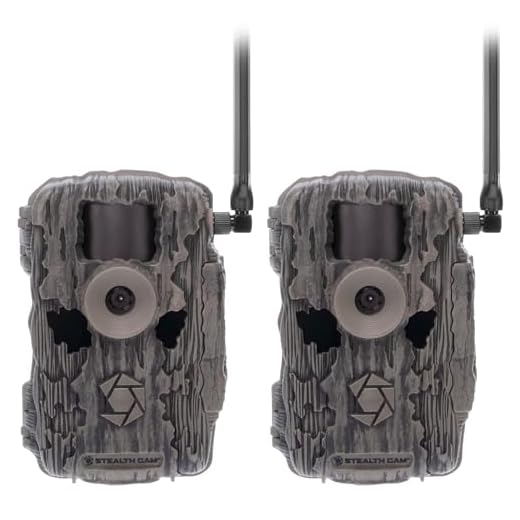





Moultrie Edge 2 Cellular Trail Camera
We value the Auto Connect 4G LTE capability and consistent app experience for monitoring multiple properties. The 36MP photos and 1080p video with audio give high-confidence scouting intel for locating mature bucks.
Why we rely on this camera for patterning deer
When we need seamless connectivity and high-resolution evidence, this camera fits the bill. Auto Connect technology removes the fiddly SIM swapping and gets us consistent uploads across U.S. networks, which is crucial when monitoring multiple properties or remote stands.
Hunting-focused capabilities
Field experience and practical limits
We were impressed with the app ease-of-use and the image/textural clarity at both day and night. The main operational cost is cellular data, and heavy upload schedules can drain batteries faster, so we recommend tuning upload frequency and resolution to balance intel needs and battery life.
Recommendations for deployment
Use these on primary trails and high-value funnels where real-time intelligence matters. Consider pairing with a solar kit or reserve extra battery trays for extended periods between maintenance checks.
SPYPOINT FORCE-PRO-S 2.0 Solar Camera
We appreciate the integrated solar for maintenance-free power on long-term posts, and the 0.2s trigger speed paired with high-resolution photos makes it an excellent scouting workhorse. The internal battery supply and included accessories simplify deployments.
Why we trust solar for long-term setups
When we want a camera to sit through a season with minimal maintenance, solar-backed models are game changers. This unit charges an internal battery and can stay powered for months, which is ideal for remote food plots and bedding area monitoring.
Standout features for deer hunters
Field pros and realistic caveats
In practice the solar option allowed us to leave cameras up through late fall without daily attention, and the trigger responsiveness caught quick-moving does and cruising bucks. There have been reports of firmware or connectivity headaches on some units, so keep firmware current and test cellular/wireless functions before long hunts.
Tactical deployment tips
Point the solar face toward the sun path for maximum charge, and mount higher for wide-area detection. Use lower-resolution modes if you need to conserve storage or reduce processing time when reviewing images.
Bushnell CORE S-4K No-Glow Camera
We see class-leading image clarity with the single 4K sensor and excellent battery life that keeps cams running longer between checks. The hybrid mode that pairs timed bursts with video helps capture fast-moving deer without guesswork.
What we use it for
When image quality is the top priority — for antler verification, behavior study, or trophy documentation — we choose a camera with a true 4K sensor. This model fits that need with a no-glow infrared option that preserves stealth at night while still delivering highly detailed frames.
Hunting-focused feature set
Field experience and caveats
In the woods we appreciated the viewing screen for quick alignment and on-site checks, and the hybrid capture setting saved us several missed opportunities on fast-moving deer. While most of our units performed flawlessly, some users have reported occasional issues around deleting images; we recommend regular firmware checks and high-quality SD cards to minimize hiccups.
Deployment advice
For long stints use lithium AAs and a large-capacity SD card; when you're running multiple cams, stagger resolutions or use hybrid mode to balance footage and storage. We also recommend masking and scent control when installing to avoid spooking wary bucks.
Browning Strike Force Pro DCL Nano
We found the dual-lens approach gives crisp daytime detail and usable low-light nighttime images, which is rare at this price point. The 4K video capability pairs with the Radiant IR to deliver clear evidence of fast-moving bucks at close range.
Purpose and our take
We put this unit in the pack when we wanted a compact, high-resolution camera that could handle both bright daylight and low-light ambushes near travel funnels. The dual-camera lens design is specifically tuned so one lens handles daytime color and the other is optimized for nighttime illumination — that matters when you wantIdentification-quality images on mature bucks.
Key features that matter to hunters
Field benefits and limitations
We appreciated how quickly the camera locks onto a target in mixed lighting; during late season dawn sits it returned sharp frames of deer moving through thick cover. The camera's compact footprint and tree-mount design make it easy to tuck into tight setups. On the flip side, advanced features push the price above budget options, and because it’s a newer model, long-term durability reports are still accumulating.
Practical notes for setup
When we deploy this camera, we aim the camera to capture a 10–25 yard zone depending on the funnel. Use high-quality SD cards and fresh batteries for best performance, and test both day and night modes before leaving it for long stints to ensure the dual lenses are functioning as expected.
Stealth Cam Fusion MAX Dual SIM Cellular
We depend on the automatic network switching to keep images flowing in areas with mixed coverage. The 0.35-second trigger and burst options make it a reliable choice for catching fast-moving bucks on tight routes.
Who should consider this camera
If you want dependable cellular transmission and industry-grade trigger responsiveness, this Stealth Cam model is aimed at serious hunters who want live intel. The automatic network coverage and on-demand capture let us check activity and confirm trophy bucks without walking to the stand.
Key hunter-centric features
Real-world performance and trade-offs
In our experience the Fusion MAX sends clear photos and on-demand videos quickly, which is a huge time-saver when patterning deer. The main downside is the power draw; the camera can be hungry on AA cells if you push frequent uploads and on-demand shots, so we strongly recommend rechargeable FieldMAX packs or solar charging for hands-off use.
Setup tips from the stand
Mount where you get a clean line of sight but still conceal the housing. Use burst settings during the rut and reduce transmission frequency on quieter properties to save battery and cellular data.
Browning Defender Pro Scout Max HD
We rely on its Dual SIM logic and high-gain antenna to stay connected where single-network cameras fail. The 24MP stills and 1080p video give dependable image quality for routine scouting and pre-season monitoring.
Why we bring this on public and private land
We choose this model when we want cellular convenience without breaking the bank. The Dual SIM setup and ultra-high gain antenna make it a practical choice for areas with spotty single-network reception — a real advantage when we’re monitoring food plots and pinch points remotely.
Features that stand out to hunters
Field performance and practical insights
In our field tests the camera triggers reliably and the app integration simplifies scouting routines. We did notice that cellular costs can add up quickly if you deploy many units, but the ability to get near-instant intel is worth it when you’re patterning mature bucks. Build quality is functional rather than luxurious, so consider locking or securing the unit appropriately.
Deployment tips from the stand
Mount it higher than a traditional camera if you want a longer detection corridor, and dial in sensitivity to reduce false triggers from branches. Keep firmware updated and use a good data plan if you want consistent, frequent uploads.
SPYPOINT Link-Micro-LTE Cellular Camera
We like the Link-Micro-LTE for tight setups where stealth and minimal visual profile matter. Its 0.5s trigger and 80-foot detection make it a capable compact cam for monitoring trails and pinch points remotely.
Where this camera fits our gear list
When we need a cam that tucks into scrapes, stands, or close-in funnels without announcing itself, a compact cellular cam is perfect. This model balances size and function: it’s small, sends images via LTE, and sits quietly in heavy pressure spots.
Key details hunters care about
Strengths and limitations in the field
The compact design allows stealthy placement near scrapes or inside corridor cover, and the cellular reporting saves us trips when we want near-real-time intel. Image resolution isn’t as high as flagship models, so for close-range antler ID or trophy documentation we may pair it with a high-res cam elsewhere on the property.
Deployment tips from experience
Place the camera where it has a clean foreground to reduce false triggers. For long season placement, monitor battery usage closely — compact cellular units often need more frequent power attention unless paired with a solar option.
Moultrie A900i MCG-14002 2-Pack
We appreciate the 30MP stills and 0.4s trigger speed in a low-cost two-pack that’s great for pressure control properties. These are dependable workhorse units to get reliable images without a big investment.
Who this bundle suits
For hunters needing to cover multiple access points, a budget-friendly two-pack that still delivers strong resolution is attractive. These units give us clear daytime images and respectable nighttime performance at a price that allows broader deployment.
Features that matter in the woods
Field performance and trade-offs
They’re reliable and simple to use — perfect for newer hunters or when we want throwaway units on unsecured properties. The trade-off is that they lack the remote cellular convenience of higher-end models, so plan routine checks to collect SD cards and swap batteries.
Practical setup advice
Place these on established trails and watch for false triggers from vegetation; a little trimming goes a long way. Use quality alkaline or lithium AA batteries to maximize time between visits.
Stealth Cam 2022 G42NG 32MP 2-Pack
We like how the no-glow IR and fast trigger speed reduce detection by deer at night. The two-pack option gives immediate coverage for multiple funnels or trail intersections without breaking the bank.
Why this appeals to deer hunters
We recommend this 2-pack when we want to blanket a piece of property with stealthy, high-resolution coverage. The no-glow IR flash prevents spooking nocturnal deer and the 0.5 second (or faster) trigger helps capture animals moving across travel corridors.
Practical hunting features
Field notes and limitations
These are solid workhorse cams for trail and food-plot monitoring. We did encounter units with sensitivity tuning issues that produced nuisance triggers in windy cover — that drains batteries and card space fast. Nighttime video can be variable in length on some units, so if long videos are a priority, test settings before long deployments.
Best deployment strategy
Use one camera to monitor the main funnel and the second to watch an alternate route or scrape. When false triggers appear, trim nearby vegetation and consider angling the camera slightly to focus on a narrower detection zone.
SPYPOINT FORCE-24 Non-Cellular Twin Pack
We use these where we don’t need remote uploads but want solid 24MP stills and 2K video. They’re simple to set up and return dependable results at a price that makes covering multiple spots realistic.
Why we put these on lower-pressure runs
When budget and coverage are the primary goals, a non-cellular camera pack allows us to monitor several funnels without subscription fees. These units deliver 24MP stills and 2K video suitable for most scouting tasks and stand placement decisions.
Practical features for everyday hunting
Field limitations and considerations
You’ll need to physically visit the cameras to retrieve images, which is fine for many property types but not ideal if you need real-time intel. Some reviewers noted occasional battery reporting quirks — use fresh, quality batteries and test before long deployments.
How we deploy them
We use one camera at a cut-through pinch point and the other at a feeding lane. Keep a maintenance schedule to rotate batteries and check SD cards to prevent lost activity during critical rut weeks.
Final Thoughts
Our top overall pick is the Moultrie Edge 2 Cellular Trail Camera. It combines Nationwide 4G LTE Auto Connect with 36MP stills and 1080p video (with audio), so we get high-confidence scouting intel from multiple properties without making extra trips. Put this on your primary funnels and food-plot edges when you need dependable remote monitoring of mature bucks and quick confirmations of movement.
For long-term, low-maintenance deployments, we pick the SPYPOINT FORCE-PRO-S 2.0 Solar Camera. The integrated solar panel and internal battery supply mean we spend less time swapping cells. Couple that maintenance-free power with the ultra-fast 0.2s trigger and high-res photos, and you get a relentless, stealthy workhorse for pinch points, trail junctions, and pressure-controlled spots where every split-second matters.
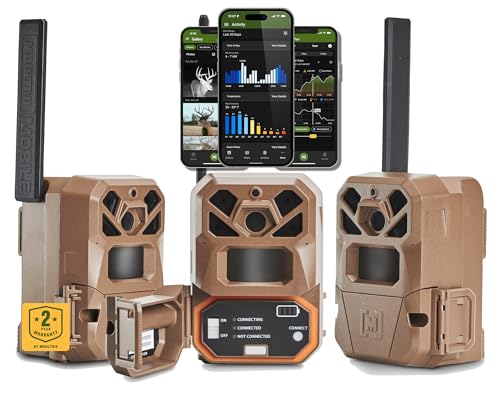
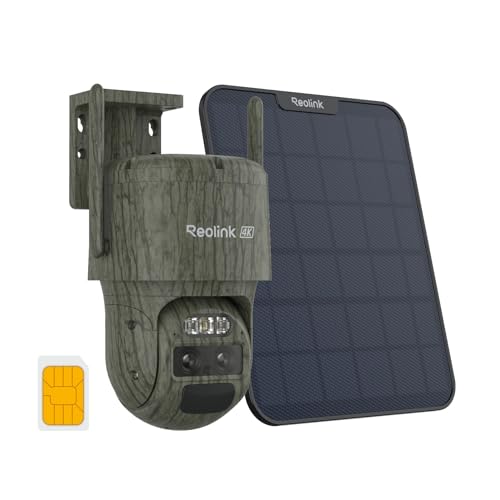
 By
By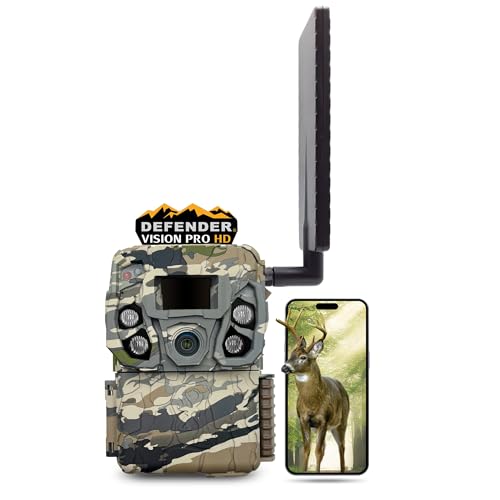
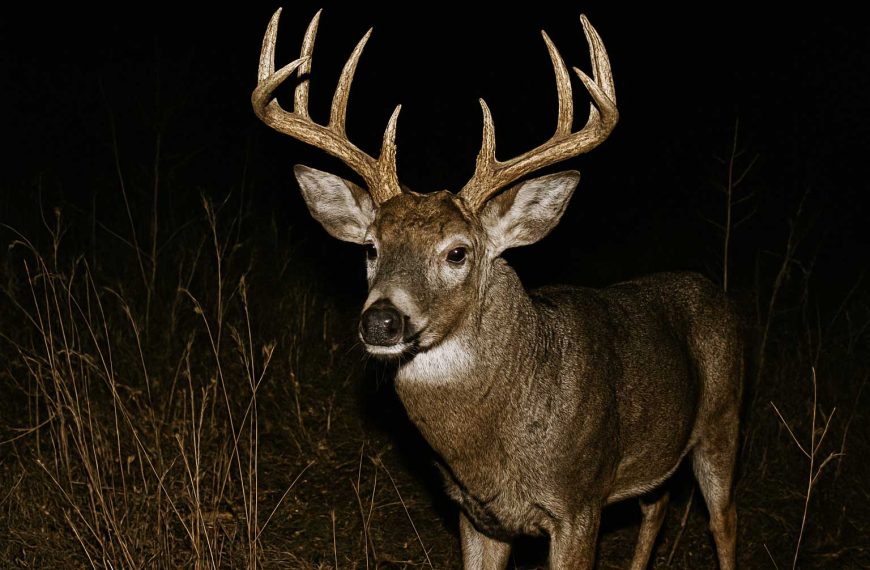


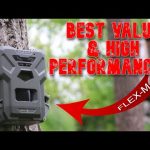
The Browning Defender Pro Scout Max caught my eye for its ultra-high gain antenna. I chase terrain that ruins single-network cams. Anyone using the Dual SIM logic in very remote spots?
We found the high-gain antenna plus Dual SIM logic to be the reason this cam performed when others didn’t. It won’t work where there’s literally zero cell signal, but it’s far better in fringe coverage areas.
Used in a canyon area — kept a steady trickle of images when my buddy’s single SIM cam went silent. Worth the upgrade if coverage is inconsistent.
Interested in the Stealth Cam Fusion MAX dual SIM two-pack. Dual-SIM sounds like a lifesaver in patchy coverage.
But 0.35s trigger — is that fast enough on a narrow trail where bucks bolt by?
Dual SIM saved me last season. Auto-switched to Verizon when AT&T went spotty — pics kept coming.
I’ve had plenty of success with 0.35s and burst. Angle the camera slightly off the trail to increase detection window.
0.35s is solid — combined with burst mode it catches most passes on tight travel routes. If you want the ultrafast 0.2s class, SPYPOINT Force-PRO-S is quicker, but the Fusion MAX balances speed and connectivity well.
Bushnell CORE S-4K looks sexy on paper. 4K for hunting — is that overkill? I mostly want crisp night shots to ID bucks.
Also, how’s the battery life compared to the no-cell alternatives?
Not overkill IMO. I crop and zoom a lot to check antler details — 4K makes that effortless.
The 1.5″ viewscreen is handy in the field for quick checks. No more guessing what the SD card has 😂
4K helps a lot for ID on daytime and dusk shots; nighttime depends more on the IR system. Battery life on the CORE S-4K is very good compared to some cell cams because it’s optimized for power consumption, but non-cell, solar, or external power options will still last longer if you minimize video.
I laughed at the dual-lens Browning Strike Force Pro — feels like camera engineering flex. But seriously, the low-light edge is appealing for pre-dawn activity.
Has anyone compared Browning’s Radiant IR with the no-glow options for spooking deer?
Radiant IR often gives stronger nighttime illumination which can produce clearer images, but some animals may notice it more than true no-glow. In our tests, Browning’s balance was good — better nighttime detail without a big uptick in detection by deer.
I run no-glow on pressured public land. If stealth is priority, go no-glow. If you need detail in total darkness, Radiant/low-glow might win.
SPYPOINT FORCE-24 twin pack seems like the no-nonsense choice. I don’t need cell uploads — just reliable pics and decent video.
Anyone using these on a long-term stand-only setup? Curious about battery life and SD card management.
I run them with 32GB cards and change twice a season. No dramas so far.
They’re excellent for stand-only deployments. Battery life is competitive if you minimize video and use quality lithium batteries; SD management is simple since you retrieve cards manually, so you can run large-capacity cards for long-term checks.
Pro tip: format the SD in-camera before deployment and use reputable brands to avoid corrupt files.
Stealth Cam G42NG two-pack: love the no-glow flash claim. I run pressure-heavy properties and need cams that don’t spook deer.
Also, who else finds the cam color/patterns easier to hide than the bulky cell cams? 😂
No-glow helps a lot in pressured fields. And yes — smaller, camo-pattern units often blend into the environment better than larger cellular housings.
100% — I put a stick in front of the housing and they vanish. Larger cell cams are great for data, but stealth wins in high-traffic spots.
Question for the group: if you had to pick one cam from this list for a beginner who wants minimal maintenance, what would you recommend?
My take: SPYPOINT Force-PRO-S for solar + fast trigger OR Moultrie Edge 2 if you want cellular monitoring. Thoughts? 🙂
I’d add: consider coverage. If your cell signal is solid and you like remote checks, go cellular. If you rarely visit the cam and have sun, solar non-cell is perfect.
Also consider budget — two-packs like the Moultrie A900i or SPYPOINT Force-24 are great if you want to blanket an area fast without breaking the bank.
Good summary. For total ‘set-and-forget’ with low maintenance: SPYPOINT Force-PRO-S (solar/endurance). For remote monitoring and quick responses: Moultrie Edge 2. Both are user-friendly for beginners.
Great roundup — I own the Moultrie Edge 2 and can confirm the 36MP pics are sharp. Auto Connect saved me a ton of time checking cams across two properties.
One thing I’d add: watch your plan costs if you have lots of pics uploading. The app is solid but I bumped into data limits faster than expected.
Thanks for sharing your real-world experience, Alex. Good call on the data plans — we noted that in the full review but it’s easy to miss until you start getting daily bursts of photos.
Do you leave it on continuous photo+video uploads? I’m wondering how to balance intel vs data usage.
I use motion photos only and occasional live view. Cuts data use a lot while still catching big bucks.
I picked up the Moultrie A900i bundle as a cheap way to put lots of cams out. 30MP surprisingly good for the price. Two-pack helped cover pinch points quickly.
Not glamorous, but they get the job done.
Totally agree. For public land rotation, I’m happy spending less per cam and swapping them out often.
I ziptied a bit of gasket tape and they’ve survived two seasons so far. Not perfect, but usable.
Do they hold up to heavy rain? I had cheap cams fail after one storm season.
Exactly — affordable two-packs like the A900i are fantastic for pressure control and patterning. You sacrifice some polish but gain coverage.
Small footprint SPYPOINT Link-Micro-LTE sounds perfect for rubs and choke points. I like compact cams for stealth.
Does the 0.5s trigger miss too many fast passing deer?
I use placement tricks (angled trail, slightly lower) to increase action time in frame. Works well with the Link-Micro.
0.5s is adequate for most choke points, especially when paired with a short detection distance and good placement. For the absolute fastest reactions, consider the Force-PRO-S, but Link-Micro-LTE’s stealth and two-pack options are great for filling gaps.
I’m leaning toward the SPYPOINT Force-PRO-S because of the solar panel and 0.2s trigger. I hunt in an area where I forget to check cams for weeks.
Anyone running the Force-PRO-S through a whole season without changing batteries?
The integrated solar is a standout — if you have decent sun exposure it’s near maintenance-free. We tested it over several weeks and saw very stable battery levels in semi-open canopies.
I’ve had one last summer and only topped it up once after a really cloudy stretch. Placement is key — facing south and not under heavy canopy.